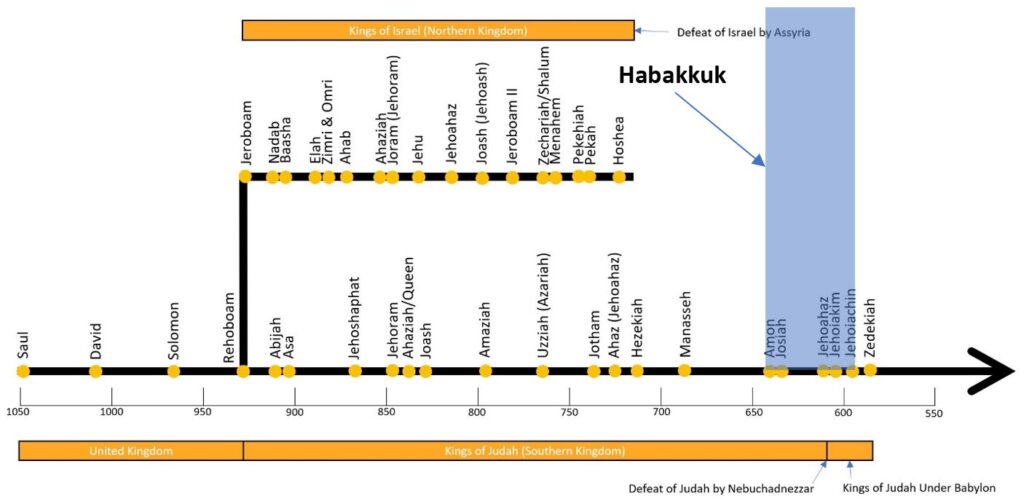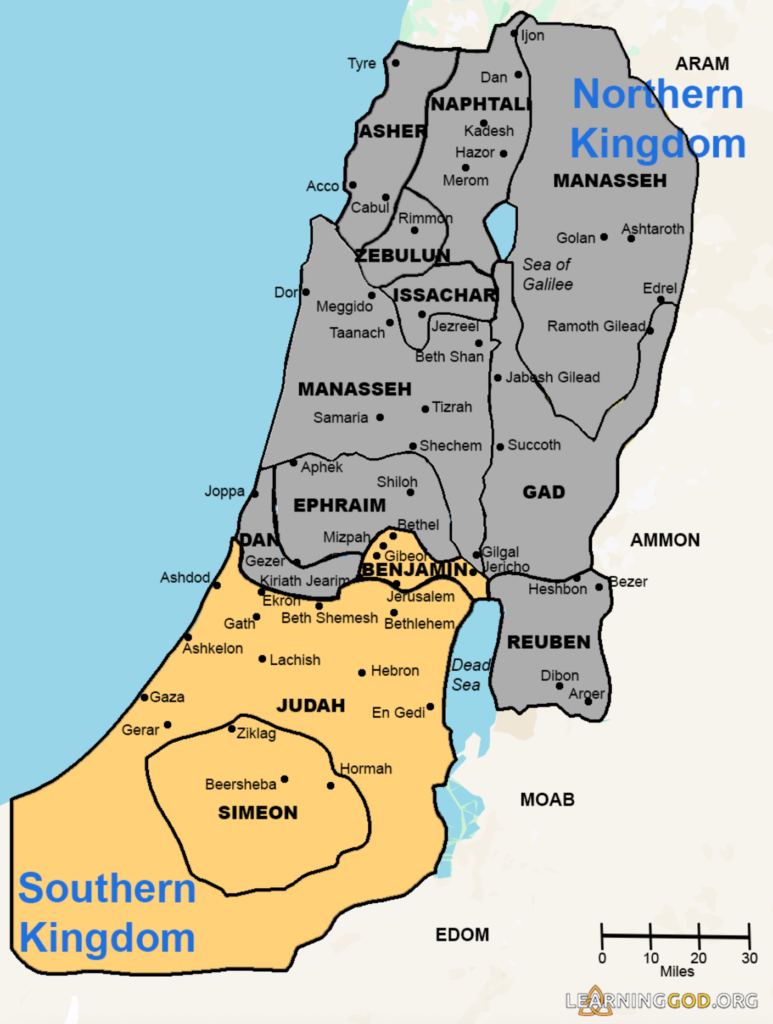Habakkuk
The Just Shall Live by Faith
Summary | About | Why You Should Read it | Author | When Written | Context | Timeline | Location | Outline | Observations | Resources
Summary
The Book of Habakkuk is one of the twelve Minor Prophets in the Old Testament. It is relatively short, consisting of three chapters, and is unique for its structure as a dialogue between the prophet Habakkuk and God. The book can be summarized in three main parts:
- Habakkuk’s Questions and Complaints (Chapters 1–2): Habakkuk begins by questioning God’s justice, asking why He tolerates evil and violence in the world, especially among His own people. The prophet is disturbed by the rampant injustice and cries out for God’s intervention. God responds, revealing that He is raising up the Babylonians (Chaldeans) to execute judgment on Judah for their wickedness. This response puzzles Habakkuk even more, as the Babylonians are a brutal and wicked nation, and he struggles to reconcile how God could use such an unrighteous people to punish His own.
- God’s Answer (Chapter 2): God assures Habakkuk that while the Babylonians will be used as an instrument of judgment, they too will eventually face punishment for their own sins. God explains that justice will come in His own time, emphasizing that “the righteous shall live by faith” (Habakkuk 2:4). God reveals a series of “woes” or judgments against the oppressors, including violence, greed, exploitation, and idolatry, showing that all nations are accountable to Him.
- Habakkuk’s Prayer and Praise (Chapter 3): The book ends with a prayer in the form of a psalm, where Habakkuk acknowledges God’s sovereignty and justice. Even though the future may bring suffering and destruction, Habakkuk chooses to trust in God. The final verses express a deep faith in God, regardless of circumstances: “Though the fig tree does not bud…yet I will rejoice in the Lord” (Habakkuk 3:17-18).
Themes:
- The problem of evil and injustice: Habakkuk wrestles with why God allows evil to prosper temporarily.
- Faith and trust in God: Even when God’s ways are not understood, the righteous are called to live by faith.
- God’s sovereignty and justice: God will ultimately bring justice, even if it seems delayed.
The Book of Habakkuk speaks to the challenges of understanding God’s plans in the midst of suffering, while encouraging unwavering trust in His justice and righteousness.
The following table provides a high-level look at the structure and contents of the book of Habakkuk.

About
Habakkuk is the 35th book of the Bible and the eighth of the books of the Minor Prophets in the Old Testament.

Why You Should Read It
Reading the Book of Habakkuk can be deeply enriching for several reasons, especially if you are seeking insight into enduring faith, justice, and God’s sovereignty:
- Wrestling with Hard Questions:
Habakkuk is unique because it portrays a prophet openly questioning God, something many people can relate to when facing personal or global challenges. If you’ve ever wondered why evil seems to go unpunished or why suffering exists in the world, Habakkuk’s raw honesty with God can provide a comforting example. His questions are deeply human, and his dialogue with God shows that it’s okay to bring doubts and struggles to God.
- Finding Faith in Uncertainty:
The central message of Habakkuk is about living by faith, even when life doesn’t make sense. God doesn’t always explain everything, but Habakkuk teaches us to trust that God is in control, even when the world seems unjust or chaotic. The prophet’s journey from doubt to trust can inspire you to deepen your faith in difficult times.
- Perspective on Justice and God’s Timing:
Habakkuk shows that God sees injustice and has a plan to deal with it, even when it’s not immediately apparent. The book provides hope that evil and corruption will not have the last word. God’s justice may seem delayed, but it is certain. This perspective can be encouraging when it seems like wrongdoing goes unchecked in the world today.
- Inspiration to Rejoice in Difficult Times:
The final chapter of Habakkuk contains one of the most powerful declarations of faith in the Bible: “Though the fig tree does not bud… yet I will rejoice in the Lord” (Habakkuk 3:17-18). This kind of hope and joy in the midst of hardship is both challenging and uplifting. If you are looking for strength in adversity or a reminder of the power of faith, this passage offers profound encouragement.
- A Call to Humility and Trust in God’s Plan:
Reading Habakkuk can remind you that God’s ways are higher than our own. The book encourages humility in accepting that we might not always understand God’s methods, but we can trust His wisdom and goodness. It’s a call to let go of our need for control and to rely on God’s perfect timing and justice.
In short, if you’re navigating doubt, seeking a deeper trust in God, or wrestling with the realities of injustice and suffering, Habakkuk offers timeless wisdom and encouragement. It’s a book that speaks to both the heart and mind, drawing you into a greater understanding of faith in the midst of life’s uncertainties.
Author
The Book of Habakkuk is traditionally attributed to the prophet Habakkuk, although not much is known about his personal life. Unlike some other prophets, Habakkuk’s background, lineage, and specific role (e.g., priest or shepherd) are not mentioned in the text. The book focuses more on his prophetic message than on his biography.
When Written
The Book of Habakkuk was likely written between 610 and 605 BCE, during a period of significant political and social upheaval in the southern kingdom of Judah.
Context
The Book of Habakkuk was written in a tumultuous period of ancient Judah’s history, likely between 609 and 598 BCE, during the final decades of the southern kingdom of Judah before its fall to Babylon. The historical context is crucial to understanding the prophet’s complaints, his dialogue with God, and the book’s themes of injustice and divine judgment. Here’s an outline of the context:
- Judah’s Decline:
Habakkuk’s prophecy came at a time when Judah was experiencing internal moral and spiritual decay. The kings of Judah after King Josiah (who led significant religious reforms) were largely corrupt. Following Josiah’s death around 609 BCE, his successors (Jehoahaz, Jehoiakim, and Jehoiachin) failed to uphold his reforms, and the nation spiraled into idolatry, injustice, and oppression. The people had abandoned God’s law, leading to widespread violence, corruption, and social disorder, which Habakkuk laments.
- The Rise of the Babylonian Empire:
During this period, the political landscape of the ancient Near East was dominated by the rise of the Babylonian (Chaldean) Empire, led by King Nebuchadnezzar II. The Babylonians were expanding their power, defeating the Assyrian Empire and eventually threatening Judah. Babylon was known for its ruthlessness, and its military campaigns were often brutal. Habakkuk likely wrote while the Babylonians were rising as a dominant force, and there were growing fears of their impending invasion of Judah.
- Injustice and Corruption within Judah:
Internally, Judah was plagued with injustice and oppression, particularly under King Jehoiakim. The ruling elite exploited the poor, and there was a breakdown of law and order. Habakkuk opens his book with a cry against the violence, injustice, and lawlessness he witnesses among his own people, questioning why God seems to tolerate such corruption.
- God’s Response: The Threat of Babylonian Judgment:
God’s response to Habakkuk’s initial complaint was shocking: He revealed that He would use the Babylonians—a cruel and pagan nation—to execute judgment on Judah for its sins. This was difficult for Habakkuk to understand, as it seemed contradictory that God would use an even more wicked nation to punish His people. The prophet’s second complaint reflects this tension, as he questions how a just God can tolerate such a violent nation like Babylon to rise to power and punish Judah.
- Awaiting the Fall of Judah and Babylon:
While Babylon was eventually used to conquer Judah (leading to the Babylonian exile in 586 BCE), God also assures Habakkuk that Babylon would not go unpunished. God’s justice would extend to all nations, and the Babylonians themselves would face judgment for their brutality and idolatry.
- Prophetic Tradition of Lament:
The book also fits within the broader tradition of Hebrew prophets who lament the moral failings of their people and cry out for God’s intervention. Like other prophets (e.g., Jeremiah, Amos, and Isaiah), Habakkuk condemns the social and religious corruption of his time, but he goes a step further by expressing his personal struggles and doubts about God’s plans.
Thus, the Book of Habakkuk reflects a time of deep moral, social, and political crisis, and the prophet’s dialogue with God explores themes of faith, justice, and the mysterious ways in which God governs the world.
Timeline
The timeline below shows from the beginning of the monarchy with Saul through the start of the Exile.
Location
Habakkuk was a prophet to Judah of the Southern Kingdom of Israel.
Outline
| I. Title (1:1) |
| II. Habakkuk’s First Complaint: (1:2-4) |
| III. God’s Answer: (1:5-11) |
| IV. Habakkuk’s Second Complaint: (1:12;2:1) |
| V. God’s Answer: (2:2-20) |
| VI. Habakkuk’s Prayer: (ch. 3) |
Observations
- Habakkuk ministers during the “death throbs” of the nation of Judah.
- Habakkuk sees the increased wickedness among the people and wants to know why God allows such iniquity to go unpunished.
- God told Habakkuk that Babylon would be His chastening rod against Judah.
- God raised up Babylon to chastise Judah.
- Babylon began to rise in power during the reign of Nabopolassar (625-605 B.C.).
- In 612 B.C., 96 years after Assyria conquered the Northern Kingdom of Israel, Babylon rebelled against Assyria.
- 16 years later, Babylon overthrew Nineveh, the capital city of Assyria. This takes place:
- 150 years after Nineveh had been spared at the preaching of Judah.
- 50 years after the prophecies of Nahum about the fall of Nineveh.
- By the time of Jehoiakim (18th king of Judah), Babylon had become the undisputed world power.
- Nabopolassar’s successor, Nebuchadnezzar, came to power in 605 B.C. and carried out a number of successful military campaigns in the west, advancing into Palestine and Egypt.
- Nebuchadnezzar’s first invasion into Palestine occurred in his first year.
- He deported some 10,000 captives from the Jerusalem area to Babylon, some 900 miles away.
- Included in the first group of captives were:
- Daniel
- Shadrach
- Meshach
- Abednego
- “The Lord is in His holy temple, Let all the earth keep silent before Him.”
Habakkuk 2:20
Old Testament
New Testament
Free Resources
Other Resources
- x


